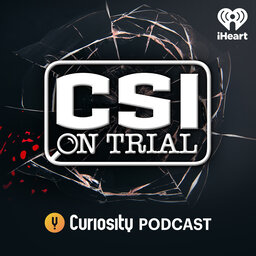In our final episode, law professor Maneka Sinha and criminology professor Nicholas Scurich join host Molly Hermann to talk about lessons learned from the series and how the criminal justice system can make forensic science more reliable.
CSI On Trial is a co-production of iHeart Podcasts and School of Humans. It is a Curiosity Podcast based on the Curiosity Stream series CSI On Trial. You can watch all six episodes of the video series here if you sign up for Curiosity Stream.
In 1 playlist(s)
CSI On Trial
It is nearly impossible to imagine a criminal investigation that does not involve some kind of foren…Social links
Follow podcast
Recent clips

CSI On Trial: Ep 7 - Arson Investigations
36:36

CSI On Trial: Ep 6-Shaken Baby Syndrome
37:10

CSI On Trial: Ep 5 - Footwear Analysis
37:44
 CSI On Trial
CSI On Trial